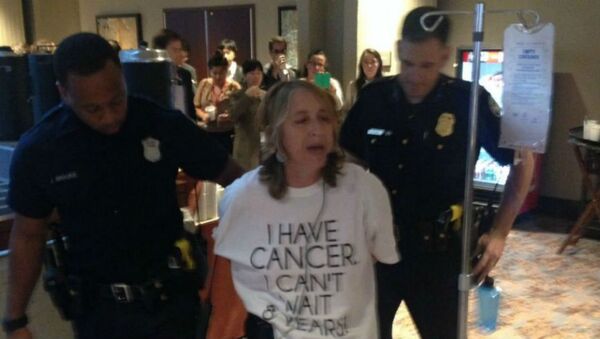Video footage showed Zahara Heckscher – who was wearing a T-shirt that read "I Have Cancer. I Can't Wait Years" and holding a hospital IV pole that read "TPP: Don't Cut My IV" – being handcuffed and led away by police after she refused to leave an area within the hotel where trade ministers were holding the high-level and secretive talks, Common Dreams reports.
Heckscher is among health advocates who have demanded the secret text of the TPP be released so they can verify that a final agreement would not include a so-called "death sentence clause" – an extension of patent protections on biologic drugs for up to eight years.
"For thousands of women to die unnecessary of breast cancer because of the TPP is a horrible, cruel, premeditated, and avoidable catastrophe," Heckscher said.
"The provisions being decided by TPP ministers today could allow drug monopolies on biologics for eight years. Some of these medicines cost up to tens of thousands, even hundreds of thousands of dollars a year."
Heckscher is seven-year survivor of breast cancer, according to Public Citizen.
"When you have breast cancer today, you can't wait eight years or seven years or six years for a treatment to become available or affordable," she continued.
"When you have cancer, even a one-year delay in affordable medicine can be a death sentence. That is why we call this proposed provision of the TPP a 'death sentence clause.' If it passes, thousands of women like me will die waiting."
Current US law grants pharmaceutical companies exclusivity for biologics – a class of drugs made from living cells with the potential to treat diseases like cancer – for 12 years, during which they are protected from generic imitations.
The range of protection in other TPP countries varies from zero to eight years. While drug companies have pushed to preserve the 12-year US standard in the TPP pact, negotiators are reportedly considering a compromise that would provide eight years of protection.


